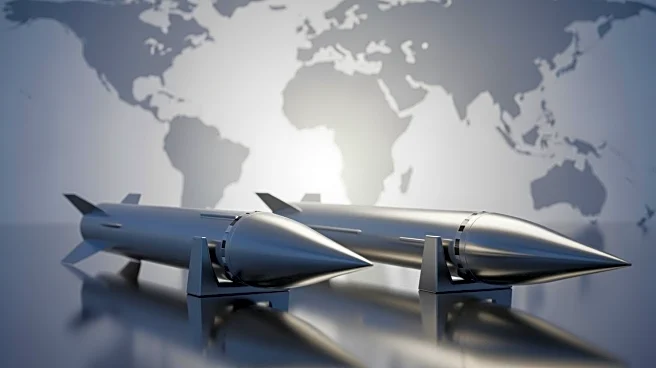What's Happening?
President Donald Trump met with Ukrainian President Volodymyr Zelensky at the White House, where discussions centered around the potential provision of Tomahawk missiles to Ukraine. Zelensky sought these
long-range missiles to target Russian energy facilities, hoping to weaken Russia's war economy. However, Trump expressed a desire to resolve the conflict without escalating military actions, stating that the U.S. needs the Tomahawks for its own defense. Following the meeting, Trump publicly called for both Kyiv and Moscow to 'stop the war immediately,' suggesting that both sides should cease fighting and return to their families. This meeting followed a phone call between Trump and Russian President Vladimir Putin, where Putin warned that supplying Tomahawks to Ukraine would damage U.S.-Russia relations.
Why It's Important?
The discussions between Trump and Zelensky highlight the ongoing complexities in U.S. foreign policy regarding the Ukraine-Russia conflict. The potential provision of Tomahawk missiles represents a significant military escalation, which could alter the dynamics of the war. Trump's call for an immediate ceasefire reflects a shift towards diplomatic resolution, potentially impacting U.S. relations with both Ukraine and Russia. The decision not to supply missiles may prevent further deterioration of U.S.-Russia relations, but it also leaves Ukraine without a critical military advantage. The broader implications include the U.S.'s role in international conflict resolution and its strategic military alliances.
What's Next?
The next steps involve potential diplomatic engagements, as Trump plans to meet with Putin in Hungary. This meeting could pave the way for direct negotiations between Ukraine and Russia, although Zelensky's involvement remains uncertain. The U.S. may continue to explore non-military avenues to support Ukraine, while balancing its diplomatic relations with Russia. The international community will closely watch these developments, as they could influence the trajectory of the conflict and the geopolitical landscape.
Beyond the Headlines
The ethical dimensions of military aid and conflict resolution are at play, as the U.S. navigates its responsibilities as a global leader. The decision to withhold Tomahawk missiles raises questions about the balance between military support and diplomatic efforts. Long-term shifts may include changes in U.S. foreign policy priorities and its approach to international conflicts.










